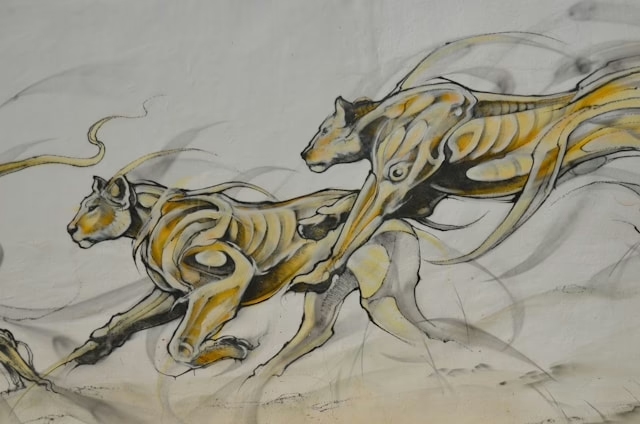🌗 Where nervous system wisdom rewrites the perimenopause/menopause playbook—part of The Reckoning Years series.
You’ve seen the memes: “Cougar puberty.”
The jokes about middle-aged women suddenly rediscovering sex, freedom, or chaos.
They’re meant to be funny, but they flatten something sacred into caricature.
This isn’t a re-run of teenage hormones—it’s a full-system reroute of power.
The truth is: midlife doesn’t reawaken libido for fun—it reclaims it for function.
You’re not “acting out.” You’re redistributing charge.
The system that once invested energy in fertility is redirecting that voltage into sovereignty, creativity, and clarity.
The Misdiagnosed Spark
Yes, perimenopause can make you feel volatile—hot, restless, alive, then flat.
That surge-and-crash rhythm gets labeled hormonal instability, but it’s really a shift in signal bandwidth.
Estrogen and dopamine are dance partners, and when estrogen drops, dopamine loses its stabilizer.
Result: bursts of motivation, attraction, and risk impulse followed by exhaustion or apathy.
The pattern mirrors adolescence—but this isn’t regression.
It’s your nervous system rebooting to run on adult voltage without reproductive buffering.
The intensity you feel is stored power finally surfacing.
No wonder it feels wild.
They call it “cougar puberty” like it’s regression—women losing composure, chasing attention, or acting out.
But the claws aren’t for catching. They’re for cutting through noise.
What looks like volatility is discernment returning to the body.
The estrogenic softness that once made you patient and diplomatic fades, and what remains is clean boundary.
You’re not cranky—you’re clear.
This isn’t about lust for youth. It’s the nervous system shedding social sedation.
The animal wakes, stretches, and remembers her power wasn’t supposed to be ornamental.

Libido as Creative Voltage
Libido isn’t just sex drive—it’s life drive.
It’s mitochondrial enthusiasm, bioelectrical coherence, the nervous system’s measure of aliveness.
When reproductive focus dissolves, that same current has to go somewhere.
Without an outlet, it leaks as irritability, insomnia, or restlessness.
With direction, it fuels purpose, clarity, and fierce self-definition.
That’s not “cougar energy.” That’s creative reorientation.
The body stops spending energy on potential offspring and starts investing it in self-expression, impact, and truth.
It’s not lust for novelty—it’s hunger for coherence.
The Nervous System Meets the New Voltage
Menopause removes the hormonal cushioning that once made chronic stress survivable.
Estrogen buffered cortisol. Progesterone buffered adrenaline.
Now the full sympathetic surge hits the system directly.
That’s why you feel overstimulated and undercharged at the same time—wired but tired.
The nervous system doesn’t know whether to sprint, scream, or collapse.
Libido spikes, then vanishes. Sleep implodes. Creativity flares, then crashes.
You’re not broken—you’re witnessing the system relearning how to conduct high voltage without distortion.
The work isn’t to suppress the swings—it’s to expand the vessel.
Every round of overstimulation followed by depletion is training your circuitry for higher throughput.
Each wave builds capacity before correction.
The Real “Second Puberty”
Adolescence was about discovering power through identity.
Midlife is about embodying power through integrity.
This is not “cougar puberty.”
It’s sovereign puberty—the moment when external validation loses leverage.
The drive is no longer about mating or approval. It’s about expression, alignment, and energetic truth.
The same circuitry that once lit up for reproduction now lights up for creation—art, work, movement, vision.
Hormones don’t cause chaos—they clear noise so you can finally hear your real appetite.
🌟 Through the Vital Clarity Code Lens
🌱 Regulate
Before you chase or suppress desire, stabilize your system.
Hydration, nourishment, rest—boring but vital.
You can’t meet high voltage on a fried circuit.
Regulation creates the margin where curiosity can return.
🌀 Rewire
Stop categorizing desire as sexual or nonsexual.
It’s all charge.
Redirect restlessness through creative or physical expression—movement, voice, tactile ritual.
Feed dopamine safely: sunlight, protein, novelty with grounding.
Let your body learn what vitality feels like without guilt.
🔥 Reclaim
You are not “too much.”
You are running on full power for the first time in decades.
Reclaiming libido means choosing where your voltage flows—into creation, connection, or clarity.
This is the shift from reaction to authorship.
✨ Resonate
Eventually, the swings settle.
Desire becomes steady, not frantic.
You stop chasing sensation and start inhabiting it.
This is resonance—aliveness without urgency, intimacy without performance.
🪶 Micropractice: The Voltage Reclaim
When restlessness hits, pause before reacting.
Close your eyes and feel where the energy gathers—pelvis, chest, throat, hands.
Breathe into it without directing it outward.
Ask, What wants to move?
Then let it: write, walk, sing, or cry.
This is libido transmuted—creative intelligence, not chaos.
What Rebuilding Feels Like
At first, it’s messy.
Voltage without direction feels like chaos—emotions flare, libido surges, sleep misfires.
But underneath, your system is building new wiring.
You’ll start to notice:
- Creative drive without exhaustion. You can follow inspiration without burning out.
- Stable desire. Libido becomes a current you can ride, not a wave that wipes you out.
- Sharper discernment. The nervous system stops confusing excitement with truth.
- Deeper rest. Energy reorganizes instead of scattering.
Rebuilding doesn’t mean taming power—it means holding it cleanly.
Midlife isn’t the end of vitality; it’s the end of leaking it.
TL;DR
Menopause libido changes aren’t chaos—they’re creative reorientation.
You’re not losing desire—you’re learning to conduct it.
Midlife reclaims voltage for coherence, not chaos.
The power was never gone—it’s finally yours to aim.
👉 Find out what your body’s voltage is trying to tell you. Start with a Vital Signal Check →
This post lives within the Menopause Hub, where we decode hot flashes, sleep changes,
weight shifts, libido, and brain fog through the lens of capacity, metabolism & the nervous system.
